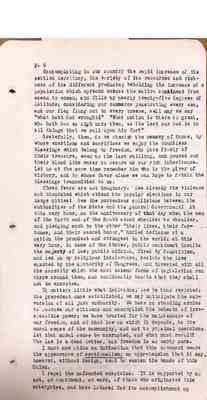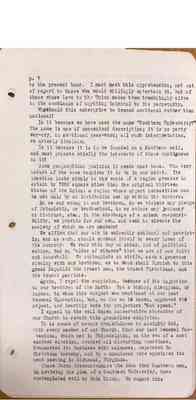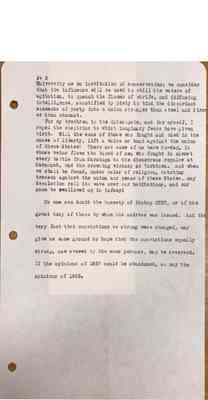Pages
6
p. 6
Contemplating in our country the rapid increase of its settled territory, the variety of its resources and richness of its different products; beholding the increase of a population which spreads across the entire continent from ocean to ocean, and fills up nearly twenty-five degrees of latitude; considering our commerce penetrating every sea, and our flag flung out to every breeze, well may we say "what hath God wrought!" "What nation is there so great, who hath God so nigh unto them, as the Lord our God is in all things that we call upon him for?"
Gratefully, then, do we cherish the memory of those, by whose exertions and sacrifices we enjoy the countless blessings which belong to freedom, who gave freely of their treasure, even to the last shilling, and poured our their blood like water to secure us our rich inheritance. Let us at the same time remember him who is the giver of victory, and by whose favor alone we can hope to retain the blessings transmitted to us.
These fears are not imaginary. See already the violence and bloodshed which attend the popular elections in our large cities! See the portentous collisions between the authorities of the State and the general Government! At this very hour, on the anniversary of that day when the men of the North and of the South stood shoulder to shoulder, and pledging each to the other "their lives, their fortunes, and their sacred honor," hurled defiance at a nation the proudest and strongest in the world: at this very hour, in some of the States, public sentiment insults the majesty of law; public opinion, fired by fanaticism, and led on by religious intolerance, resists the laws enacted by the authority of Congress, and invested with all the sanctity which the most solemn forms of legislation can throw around them, and confidently boasts that they shall not be executed.
It matters little what individual law be thus resisted: the precedent once established, we may anticipate the subversion of all just authority. We have no standing armies to overawe our citizens and accomplish the behests of irresponsible power: we have trusted for the maintenance of our freedom, and of that law on which it depends, to the moral sense of the community, and not to physical coercion: let that moral sense be corrupted, and what must result? The law is a dead letter, and freedom is an empty name.
I must now ntice an intimation that this movement wears the appearance of sectionalism; an apprehension that it may, however, without design, tend to weaken the bands of this Union.
I repel the unfounded suspicion. It is supported by no act, or sentiment, or word, of those who originated this enterprise, and have labored for its accomplishment up
7
p. 7
to the present hour. I must meet this apprehension, not out of regard to those who would willingly entertain it, but of those whose love to the Union makes them tremblingly alive to the semblance of anything inimical to its perpetuity.
Why should this enterprise be deemed sectional rather than national?
Is it because we have used the name "Southern University?" The name is one of convenient description; it is no party war-cry, no sectional pass-word; all such interpretation, we utterly disclaim.
Is it because it is to be founded on a Southern soil, and must promote chiefly the interests of those contiguous to it?
Some geographical position it needs must have. The very nature of the case requires it to be in our midst. Its location looks simply to the wants of a region greater in extent by 7820 square miles that the original thirteen States of the Union: a region whose urgent necessitites can be met only by an institution set up within its borders.
Do we any wrong to our brethren, do we violate any pledge of friendship, or brotherhood, do we evince any jealousy or distrust, when, in the discharge of a solemn responsibility, we provide for our own, and seek to elevate the society of which we are members?
We affirm that our aim is eminently national and patriotic; and as such, should commend itself to every lover of his country. We rear this day an altar, not of political schism, but an "altar of witness" that we are of one faith and household. We contemplate no strife, save a generous rivalry with our brethren, as to whom shall furnish to this great Republic the truest men, the truest Christians, and the truest patriots.
Again, I repel the suspicion, because of its injustice to our brethren of the North. Not a bishop, clergyman, or layman, to whom this subject was mentioned at our last General Convention, but, so far as its known, approved the object, and heartily bade its projectors "God speed."
I appeal to the wll known conservative character of our Church to rebutt this groundless suspicion.
It is cause of devout thankfulness to Almighty God, with every member of our Church, that our last General Convention, which met in Philadelphia, on the eve of a most excited election, avoided all disturbing questions, transacted its business with calmness, separated in Christian harmony, and by a unanimous vote appointed its next meeting in Richmond, Virginia.
These facts discountenance the idea that Southern men, in devising the plan of a Southern University, have contemplated evil to this Union. We regard this
8
p. 8
University as an institution of conservatism: we consider that its influence will be used to still the waters of agitation, to quench the flames of strife, and diffusing intelligence, sanctified by piety to bind the discordant elements of party into a union stronger than steel and firmer than adamant.
For my brethren in the Episcopate, and for myself, I repel the suspicion to which imaginary fears have given birth. Will the sons of those who fought and bled in the cause of liberty, lift a voice or hand against the union of these States? There are some of us here to-day, in whose veins flows the blood of men who fought in almost every battle from Saratoga to the disastrous repulse at Savannah, and the crowning victory at Yorktown. And when we shall be found, under color of religion, hatching treason against the union and peace of these States, may desolation roll its waves over our habitations, and our name be swallowed up in infamy!
No one can doubt the honesty of Bishop OTEY, or of the great body of those by whom his address was issued. And the very fact that convictions so strong were changed, may give us some ground to hope that the convictions equally strong, now avowed by the same persons, may be reversed. If the opinions of 1857 could be abandoned, so may the opinions of 1863.


